Who’s Afraid of Democracy?
A new aspirational class beyond the influence of the traditional parties is emerging in Jammu & Kashmir
 Ram Madhav
Ram Madhav
 Ram Madhav
Ram Madhav
 |
30 Aug, 2024
|
30 Aug, 2024
/wp-content/uploads/2024/08/Democracy1.jpg)
(Illustration: Saurabh Singh)
THE INCREDIBLE ACHIEVEMENTS of Prime Minister Narendra Modi’s government in Jammu and Kashmir (J&K) in the last five years since the abrogation of Article 370 are not fully appreciated by many. People in the government and outside confine the narrative largely to the developmental activity in the various regions of the Union territory.
Undoubtedly, the developmental work that has happened in the last five years has been phenomenal given the fact that the region faces some serious disadvantages due to its remoteness, connectivity challenges, lack of resources, sparse population density, and proneness to natural disasters. Two things, highlighted by Prime Minister Modi during his maiden visit to Srinagar in March 2024 after the abrogation, speak volumes about the transformation that the region is going through. In 2023, the number of tourists visiting the Union territory has crossed 20 million and a substantial number of them were foreign visitors. Second, the Jammu and Kashmir Bank, once a heaven for loot and plunder for local politicians and sunk in deep distress a decade ago, has bounced back and posted a profit of ₹1,700 crore this year.
A development package of over ₹90,000 crore was sanctioned by the prime minister in 2015 for J&K. It helped set in motion more than 50 projects in sectors such as roads, power, education, health, tourism, and agriculture. The Union Territory today has eight medical colleges, 28 nursing colleges, and 19 paramedical colleges. While the AIIMS in Jammu is already functional, work on an AIIMS in Kashmir Valley is in full swing. Jammu has also been granted an IIT and an IIM. Under the PM Gram Sadak Yojana, over 7,000km of rural roads have been constructed. National Highway 44, which connects Jammu and Srinagar, has been upgraded by constructing the 8.5km-long Qazikund-Banihal tunnel that reduced travel time between the two cities by half. The youth of J&K received massive support from the administration with almost 60,000 new job opportunities being provided by way of filling the vacancies or recruitment programmes. Mission Youth, a flagship programme of the J&K administration has over five lakh beneficiaries while the schemes for self-employment helped over 7.5 lakh other youths.
Prime Minister Modi was not exaggerating when he told a massive rally in Srinagar during that visit, “This is the new Kashmir we all were awaiting for decades. This is the new Kashmir for which Syama Prasad Mookerjee sacrificed his life. Your smiling faces are watched in the country right now and will bring satisfaction to all the countrymen.”
But to limit this story of transformation to physical development alone would be a mistake. A fundamental change is taking place in the thinking and mindset of the people of the region that manifests through three less-talked-about dimensions of civic life. First, the domestic element of terrorism, which witnessed its peak 10 years ago in the wake of the elimination of young terrorist Burhan Wani, has completely crumbled. There were times when four to five hundred youths used to join the ranks of terror every year and the number of active terrorists in the region used to constantly hover around 300. But today, that number has come down to single or at most double digits. In 2023, only 19 boys from Kashmir Valley were reported to have joined the terror ranks while in the last eight months, just four such cases were reported. While a few terrorists from across the border seem to have managed to sneak into the Jammu region and perched on top of the inhospitable hill terrains of Doda, Kishtwar and Poonch, occasionally targeting security forces and civilians, they no longer enjoy any local recruitment or support.
The recent Mood of the Nation survey showed that people in Jammu & Kashmir no longer talk about issues like terrorism, separatism, Pakistan. Instead, as in any other part of the country, their main concerns are also about employment, inflation, and law and order. Popular discourse is centred round the development that has taken place since the abrogation of Article 370
This, coupled with strict counter-terror measures taken by the administration like intensified cordon and search operations, active intelligence sharing, 24/7 area domination, and preventive measures like identifying and neutralising overground support networks for terror, has resulted in considerable reduction in incidents of terror and civilian casualties. The number of terror attacks had come down from 228 in 2018 to 41 at the end of 2023. Deaths of civilians and security personnel, too, witnessed a fivefold reduction during the same period.
That brings up the second issue of public sentiment. There was a time, not long ago, when the state would witness more than 300 incidents of stone-pelting in a single day. Resentment among the youth was at its peak, with thousands hitting the streets at the smallest provocation. Bandhs, hartals and shutdowns were the order of the day in the state just half-a-decade ago. Pakistan was omnipresent in the public discourse of the Valley. Slogans like ‘Jeeve Jeeve Pakistan (Long Live Pakistan)’ and ‘Pakistan Zindabad’ used to be a mantra for the disgruntled youth. But in just five years, the narrative has turned to the opposite. There have been no instances of stone-pelting, or hartal in the last few years. The ‘Pakistan dream’ of the Valley youth has completely evaporated. On the contrary, Pakistan is the butt of jokes and memes for its failed democracy and crumbled economy.
The Mood of the Nation Survey, conducted by C-Voter for a media agency recently, showed that people in J&K no longer talk about issues like terrorism, separatism and Pakistan. Instead, as in any other part of the country, their main concerns are also about employment, inflation, and law and order. Popular discourse is centred round the development that has taken place after the abrogation of Article 370 and the need for more of it. “In J&K, people no longer talk about terrorism. Instead, they want more development. They are enthusiastic about joining the mainstream. The situation on the ground has completely changed in the last five years. After the abrogation of Article 370, political mood inJ&K has totally transformed,” the C-Voter survey concluded in August this year.
THE BANE OF Jammu and Kashmir has been the stranglehold of two families—the Abdullahs and the Muftis—on the political institutions of the state in the last several decades. That the people of the Union territory, especially those in the Kashmir Valley, were fed up with the domination of these families became clear in the immediate aftermath of the abrogation in 2019 itself. For one full year, the state remained absolutely calm. People had lived under Article 370 for almost seven decades. It benefitted only a couple of hundred political families in the state while the man on the street remained hapless. People responded to the abrogation as though they wanted to give life under “no-370” a try for a few years, so much so that on the first anniversary of its demise, in August 2020, there were no significant protests in the Valley. One protest march called by the Abdullah family at Lal Chowk had fizzled out with nobody except the family members present.
The message was clear: people are afraid of the Gupkaris, not the Indian state. The years following the abrogation saw grassroots democracy flourish in the Union territory. J&K was in a way the only state which had implemented the 73rd and 74th Amendments to the Constitution in letter and spirit by empowering local bodies with not only funds but also functions and functionaries. Having completed elections to the village panchayats before 2019, the administration of the newly formed Union territory went ahead with elections to the District Development Councils (DDCs) in November 2020. It was in a way the first acid test for the Modi government in gauging public sentiment. Valley-based parties, opposed to the abrogation of Article 370, including the National Conference (NC), Peoples Democratic Party (PDP), People’s Conference (PC) and others, formed an alliance by the name People’s Alliance for Gupkar Declaration (PAGD). The Gupkar Declaration was a joint statement issued by the Valley parties opposing the Centre’s move of abrogating Article 370. A year after the abrogation, PAGD passed another resolution in August 2020 demanding the return of the rights of the state as before August 5, 2019, the day Article 370 was abrogated. Gupkar Road in Srinagar is where the power elite, the Abdullahs and the Muftis, live, which also leads to the Raj Bhavan, the nerve-centre of power in a Union territory. PAGD subsequently became popularly known as the Gupkar Alliance.
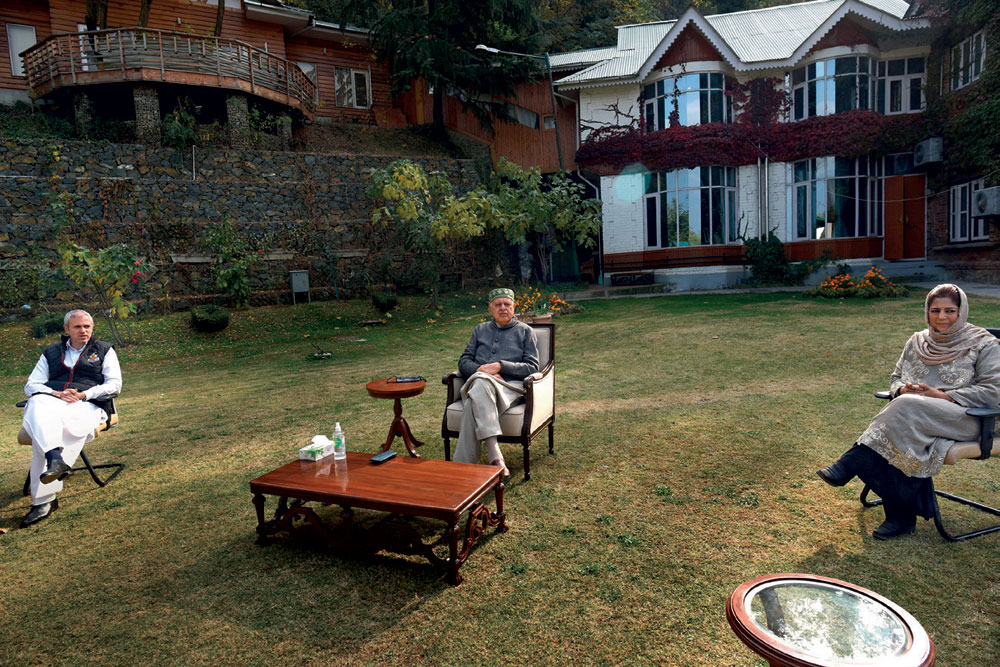
The Abdullahs and the Muftis are stuck in a time warp. Where even a hardline group like Jamaat desisted from talking about issues of the past like autonomy and Article 370, the manifesto and speeches of Gupkaris are full of soft-separatist rhetoric of restoring Article 370
Although the Gupkaris initially insisted that they would boycott elections until the pre-2019 status was restored, they ultimately climbed down and decided to take part in the DDC elections as an alliance, hoping for a windfall. The results highlighted the changing public mood. First of all, they participated more enthusiastically in the DDC elections than in the parliamentary elections held just a year earlier, with 51 per cent voting. Secondly, the Gupkaris, despite coming together hoping for a clean sweep, ended up securing just 110 out of 280 seats that went to polls.
Faith in Indian democracy has gone up further in the minds of the people of the Valley in the last three years since the DDC elections. By the time the Lok Sabha elections came in April-May 2024, there was palpable enthusiasm among the voters. While the turnout touched almost 60 per cent in the five seats of the entire Union territory, it was 51 per cent in the three Valley seats of Baramulla, Srinagar and Anantnag-Rajouri. This was a 35-year high in a region traditionally prone to poll boycotts. The high point of the parliamentary elections of 2024 was the statement by the chief cleric of Kashmir and Hurriyat chairman Mirwaiz Umar Farooq just before polling day. Hurriyat leaders like Syed Ali Shah Geelani and Abdul Gani Lone used to contest elections before the outbreak of terrorism in the 1990s. But they steadfastly rejected elections in the last three decades and Hurriyat used to issue boycott calls at the time of every election. However, Mirwaiz, the lone credible Islamic voice in the Valley, argued this time that the boycott call “does not seem to carry the sense or yield the impact like in the past”. Indirectly calling people to vote, Mirwaiz argued that they have “enough political maturity and wisdom” to do what is best in the situation.
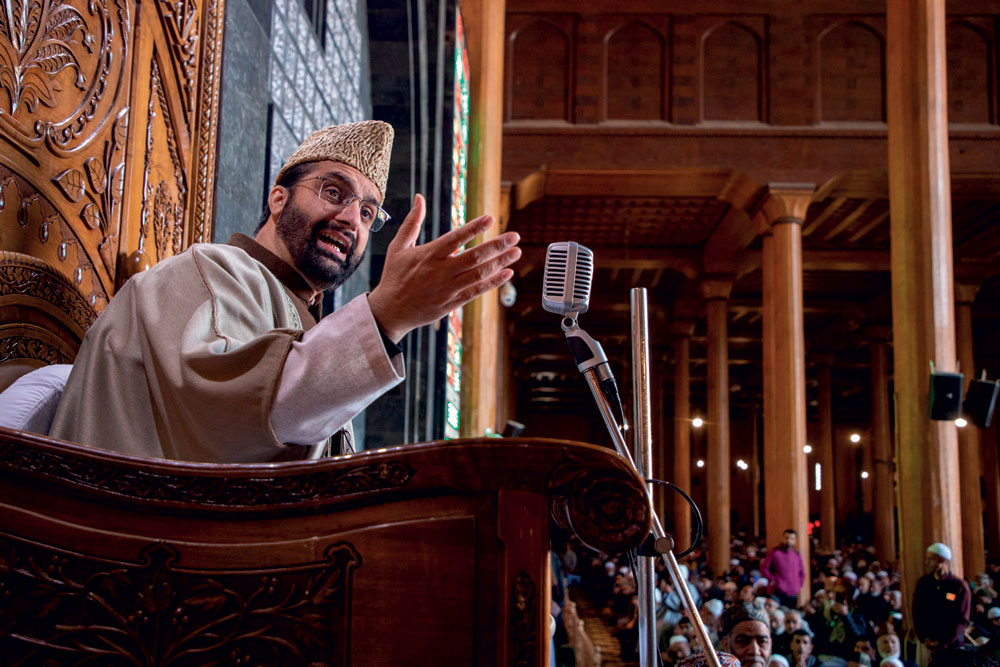
Hurriyat chairman Mirwaiz Umar Farooq has argued this time that a poll boycott call ‘does not seem to carry the sense or yield the impact like in the past’. Indirectly calling people to vote, Mirwaiz argued that they have ‘enough political maturity and wisdom’ to do what is best in the situation
The Valley voters did their best and demonstrated their maturity. For the first time in the electoral history of J&K, leaders belonging to three distinct communities were elected from the three constituencies in the Valley—a Sunni Muslim from Baramulla, a Shia from Srinagar, and a Gujjar from Anantnag-Rajouri. The results also delivered an important message that the despotism of the Abdullahs and the Muftis is no longer acceptable. In the stronghold of the Mufti family in South Kashmir, people handed a shocking defeat to Mehbooba Mufti. She lost the election to a prominent Gujjar leader, Mia Altaf, by a whopping margin of almost three lakh votes. In North Kashmir, a traditional stronghold of NC, another shock awaited Omar Abdullah. He lost to an independent candidate, Abdul Rashid Sheik, popularly known as Engineer Rashid, by a margin of more than two lakh votes. Interestingly, Rashid is in Tihar Jail as a terror suspect and his campaign was run by his son and family.
PRIME MINISTER MODI’S decision to hold Assembly elections is a vindication of his respect for the sentiment of the people of the Union territory—for true democracy and a popular government. The Union territory will have elections to its legislature in three phases during September-October and is expected to have the first-ever elected Union territory government in October this year.
As J&K was preparing for elections came another pleasantly surprising twist when the overtly pro-Pakistan Jamaat-e-Islami, a known dissident force in the Valley facing a ban since 2019, issued a statement praising elections. Jamaat was the main Hurriyat constituent which had always used its grassroots base of mosques and madrassas to discourage people from participating in elections, resulting in very low turnouts in its strongholds of South Kashmir. Agencies in Kashmir Valley knew that the Jamaat leadership always received instructions from across the border.
However, the Jamaat leadership issued a statement recently that they would ask supporters to not only vote but also contest in the elections as independents since Jamaat is a proscribed body and cannot contest in its name. Rendering a big slap on the face of Pakistan, the Jamaat leadership admitted that the Lok Sabha results were proof that there was no rigging or malpractice, and the results were in line with the people’s mandate. “We are convinced that we will vote,” the Jamaat declared giving its thumbs up to Indian democracy. “The JeI has always respected and worked within the framework of Constitution of India and will continue to do so in future. JeI does not support militancy,” it declared.
The whole world is watching while J&K is turning a new page in its democratic future. Critics were silenced after the main protagonists of separatism in the Valley endorsed the fairness of Indian democratic and electoral systems under Prime Minister Modi. A new aspirational class is coming forward to chart a course of peace, progress and prosperity. A new non-NC and non- PDP leadership is rising in Kashmir politics. While encouraging this transformation, the government is committed to ensuring their aspirations for a free and fair mandate are fully satisfied.
The Abdullahs and the Muftis are stuck in a time warp. Where even a hardline group like Jamaat desisted from talking about the issues of the past like autonomy and Article 370 and declared that if elected, its candidates will work for reviving the fruit industry, resolving the issue of unemployment, and also work for addressing the issues of non-Muslims, the manifesto and speeches of the Gupkaris are full of soft-separatist rhetoric of restoring Article 370. Historically, the Gupkaris have used this emotional rhetoric to deceive the Valley voters. When they got Article 370, they harped on the demand for ‘greater autonomy’. When Article 370 is gone, they are haranguing about bringing back autonomy and Article 370.
The Gupkaris have lived for far too long in history and sold history. It is time they became history.

/wp-content/uploads/2025/07/Cover_Dalai-Lama.jpg)






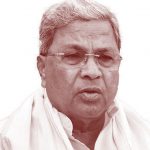

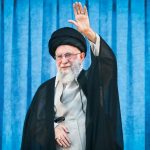

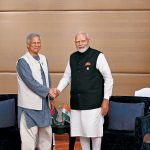

More Columns
From Entertainment to Baiting Scammers, The Journey of Two YouTubers Madhavankutty Pillai
Siddaramaiah Suggests Vaccine Link in Hassan Deaths, Scientists Push Back Open
‘We build from scratch according to our clients’ requirements and that is the true sense of Make-in-India which we are trying to follow’ Moinak Mitra